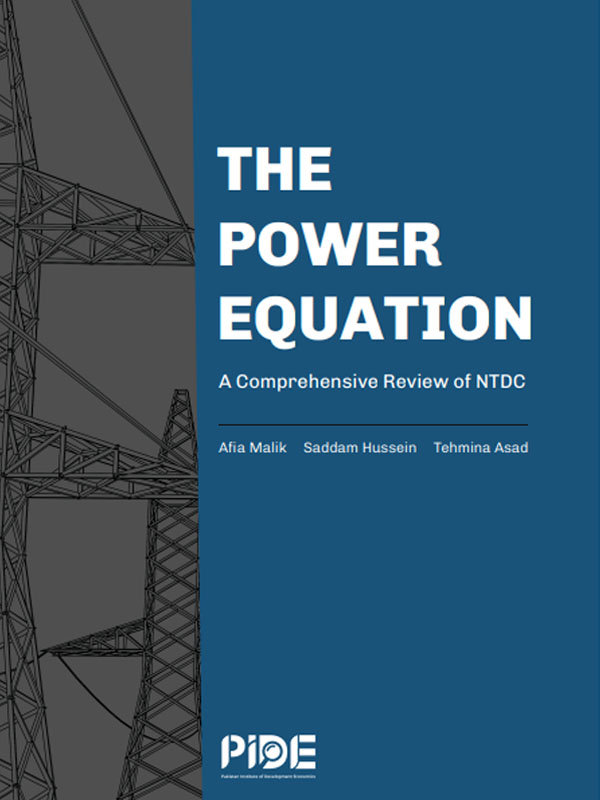
Pakistan Institute of Development Economics
- Home
Our Portals
MenuMenuMenuMenuMenuMenuMenu - ResearchMenuMenuMenuMenuMenuMenuMenu
- Discourse
- The PDR
- Our Researchers
- Academics
- Degree Verification
- Thesis Portal
- Our Portals
The Power Equation: A Comprehensive Review of NTDC
A Comprehensive Review of National Transmission and Dispatch Company Limited
Contents
The Power Equation
A Comprehensive Review of National Transmission and Dispatch Company Limited
List of Abbreviations
Executive Summary
1. Setting the Context
1.1.NTDC’s Functions and Responsibilities
1.2. Rationale for Evaluation
2. Methodology
2.1. Study Questions
3. Key Findings – Gauging NTDC’s Effectiveness and Efficiency
3.1. Transmission Network and Performance
3.2. NTDC as a System Operator
3.3. System Planning
3.4. Procurement Imbroglio
3.5. Regulatory Compliance
4. NTDC’s Financial Security
5. Governance at NTDC
6. NTDC – Charting New Horizons
7. Conclusion and Way Forward
Technology, Innovation, and Operational Efficiency
Governance, Corporate Governance, and Transparency
Financial Security
Bibliography
This study reviews NTDC’s performance as the national grid and system operator. A case study approach is adopted to evaluate the effectiveness of NTDC’s performance. The study finds:
Key Findings
- The transformation capacity of (19) 500kV grids is 25950 MVA (roughly equivalent to 25950 MW), against the installed capacity of 43,749 MW—much below the satisfactory level.
- 15 (550 kV) and 39 (220 kV) transmission lines are overloaded (80% and above). On the other hand, 53 (550kV) and 65 (220kV) lines are underutilized (30% or less) – reflecting inadequate planning.
- Overloaded lines affect reliability, and underutilized transmission infrastructure is increasing per-unit transmission costs for end-consumers.
- Transmission constraints resulted in a loss of PKR20.203 billion in FY2023.
- Over-loaded transmission lines, inadequate transformation capacity of power transformers, and transmission line outages are a few reasons behind the under-utilization of efficient power plants.
- In FY2023, PKR 46.6 billion was paid to power plants for Part Load Adjustment Charges, which increased fuel cost adjustments for end-consumers.
- Economic Merit Order (EMO) violations greatly influence the cost per unit for end-consumers.
- EMO has not yet established specific criteria to rank take-and-pay and take-or-pay power plants differently.
- The total financial impact caused by supply loss incidents amounted to approximately PKR 11.9 billion (from FY2015 to FY2023).
- Tower collapses have become frequent in recent years, disrupting the power supply, posing safety hazards, and jeopardizing the integrity of the entire network.
- The system’s interruption frequency has increased by 400%.
- The outdated power system mechanism is responsible for frequent blackouts in the country.
- Overloaded transmission lines, equipment failure, poor maintenance, malfunctioning control systems, outdated communication modes, and the lack of trained staff are all responsible for blackouts and delays in restoration.
- No approved Transmission System Expansion Plan (TSEP) is available.
- It is an important document that plays a crucial role in the systematic growth of the power sector.
- The Integrated Generation Capacity Expansion Plan (IGCEP) for 2021 and 2022 has been developed by NTDC and approved by NEPRA.
- Deficiencies in demand forecasting have resulted in over-forecasted demand and consequent surplus in installed generation capacity, leading to a capacity payment burden for consumers.
- NTDC has sufficient funds for infrastructure upgrades and expansion – the challenge lies in its effective utilization.
- Failing to meet deadlines is causing cost overruns and delays.
- It is due to the lack of established processes, insufficient and incompetent human resources, limited opportunities for capacity-building, and outdated software.
- NTDC lacks initiative; donor agencies have driven all recent efforts to upgrade technology and integrate renewables.
- NTDC’s increasing dependence on foreign loans is increasing financing costs (28% growth from FY2014 to FY2023), jeopardizing its future financial stability.
- The primary problem lies in its governance structure.
- Despite being an independent organization, NTDC still operates with a bureaucratic mindset.
- Over-staffed, BPS scales, and no performance based annual bonuses/ incentives.
- Communication hurdles within the organization are affecting performance.
- The presence of non-expert members and excessive government representation in NTDC board, compromises NTDC’s ability to make independent decisions.
- Politically appointed (and temporary) Managing Directors (MD).
- Senior management is getting a market salary, but not linked to their performance.



